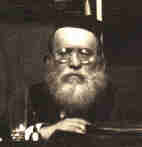 |
Hadrash Ve-Haiyunby the Reisha Rav, HaGoan Rav Aaron LevineElucidated and Adapted by Efraim Levine |
 |
Hadrash Ve-Haiyunby the Reisha Rav, HaGoan Rav Aaron LevineElucidated and Adapted by Efraim Levine |
Mishpatim
Dedicated in Honor of
Aliza Levine
To Dedicate Please Contact Hadrash Ve-Haiyun
When you will lend money to My people, to the poor person who is with you, do not act toward him as a creditor; do not place interest upon him. (Shemos 22:24)
The Gemara (Yevomos 63a) says: Concerning one who lends a poor man money in his hour of need the posuk says: Then you will call and Hashem will respond, you will cry out and Hashem will say here I am.
The simple meaning of the words "in his hour of need" is that this phrase refers to the hour of need of the poor man. However, this interpretation is difficult. Is it not obvious? Why would the poor man seek assistance if it were not his hour of need? A homiletic interpretation would render "in his hour of need" as referring to the lender. The interpretation of this dictum would thus convey the following: If a man is so gracious that even in his own hour of need he still does not forsake the poor man then he is truly worthy of great blessing.
Based on this interpretation we may now reinterpret our posuk. The posuk simply conveys a warning not to harm the poor man who lives together with you by charging interest or demanding payment. We may ask, does this only apply to a poor man who lives together with you and not to a poor man who lives at a distance? Let us suggest that the words "with you" are not to be interpreted only as the poor man that lives together with you but rather as the poor man that shares the same class of poverty as you. The posuk now conveys the following: Even when you find yourself suffering from poverty just like the poor man that you lend money to, do not use this as an excuse to lend with interest or demand unjust payment. Rather, rich and poor alike share the same obligations when lending money to another individual.
Alternatively, the seemingly superfluous words "with you" may be interpreted based on the following dictum: When a person departs from this world he will not be accompanied by gold or silver nor precious stones or pearls but only by Torah and good deeds (Avos 6:10). Our posuk informs us that although the money itself cannot accompany you into the next world but through this Mitzvah it is now "with you" and its merit will indeed accompany you into the next world.